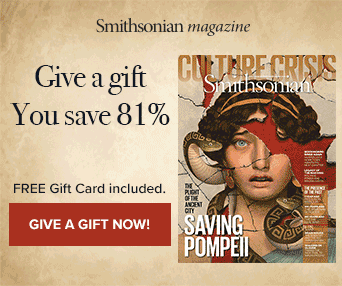CURRENT ISSUE
January/February 2020
Features
/https://tf-cmsv2-smithsonianmag-media.s3.amazonaws.com/filer/8d/c4/8dc444c2-f1f4-4189-8a7b-d2e755fa994c/quadraisland_socialmedia.jpg)
The Fertile Shore
It’s one of the greatest mysteries of our time. But archaeologists and even geneticists are closer than ever to understanding when humans made the first bold journey to the Americas
/https://tf-cmsv2-smithsonianmag-media.s3.amazonaws.com/filer/48/db/48dbe3d0-7a52-4c48-a924-7aead6040add/pharmasocial_medianew.jpg)
Nature's Pharmacy
An ancient legend leads to a graveyard in Northern Ireland where scientists are zeroing in on a powerful new antibiotic
:focal(2437x1508:2438x1509)/https://tf-cmsv2-smithsonianmag-media.s3.amazonaws.com/filer/6a/32/6a327f03-e0fe-4394-be29-07b41eac8f65/socialmediaamazonhighway.jpg)
The Road to Ruin?
Brazil’s plan to improve a lonesome track in the heart of the Amazon rainforest poses a threat the whole world may someday have to overcome
/https://tf-cmsv2-smithsonianmag-media.s3.amazonaws.com/filer/04/8b/048b4237-3143-4d6b-8620-b03120293ee8/formula_social_media.jpg)
The Charlatan Will See You Now
A notorious quack peddled cures at an Arkansas hotel in the 1930s. Nowadays the con game is all for show
/https://tf-cmsv2-smithsonianmag-media.s3.amazonaws.com/filer/7f/49/7f49b612-90ee-4904-92ff-e96041daa9c0/b17-social.jpg)
The Navigator
A son discovers the astonishing heroism of the U.S. mission to bomb a Nazi weapons factory in Czechoslovakia
/https://tf-cmsv2-smithsonianmag-media.s3.amazonaws.com/filer/87/0d/870d50eb-ab19-4e78-84f0-31847c0a050a/bluenigermountains_smc.jpg)
Forgotten Desert
A photographer ventures into remote northern Africa for an unprecedented view of one of the world’s most troubled, and least understood, regions
Departments
Courageous
Maya Angelou’s breakthrough memoir, published 50 years ago, launched a revolution in literature and social awareness
Flower Power
In big, bold canvases, the Mexican muralists put their own stamp on 20th-century art
Tracing the Enslaved
A massive new online database connecting billions of records offers vital details about slavery’s toll
Hey, Bartender
A century after Prohibition, we uncork a history of the nation’s changing drinking habits
Made in Alaska
The coolest shades in the Arctic, fashioned to protect against snow glare, were an early example of indigenous ingenuity
The Veneration Gap
Older people have groused about younger people for millennia. Now we know why
Ask Smithsonian
You've got questions, we've got experts

